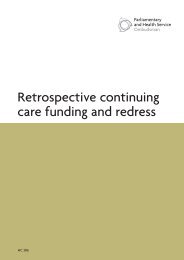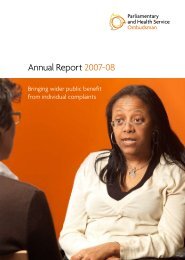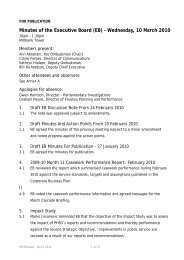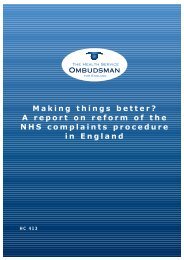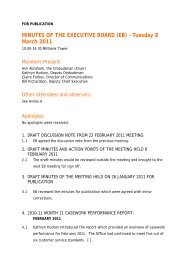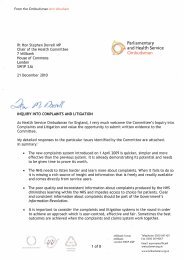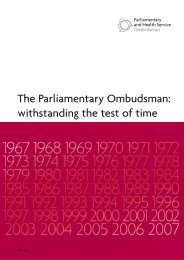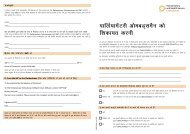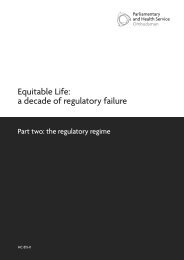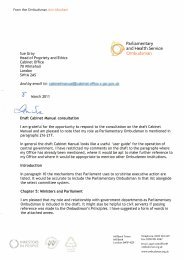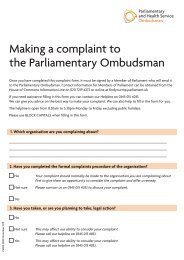Putting things right: complaints and learning from DWP - the ...
Putting things right: complaints and learning from DWP - the ...
Putting things right: complaints and learning from DWP - the ...
Create successful ePaper yourself
Turn your PDF publications into a flip-book with our unique Google optimized e-Paper software.
communications failings between <strong>the</strong>m. It is not<br />
just <strong>things</strong> that fall between <strong>the</strong> gaps, however,<br />
but people <strong>the</strong>mselves. In Mrs M’s case (page 57)<br />
problems arose after <strong>the</strong> death of her husb<strong>and</strong><br />
because Jobcentre Plus had not ensured that<br />
Coroners’ Offices provided <strong>the</strong> correct information<br />
about bereavement benefit. Consequently, Mrs M<br />
fell through a gap in <strong>the</strong> system <strong>and</strong> missed <strong>the</strong><br />
opportunity to claim over a thous<strong>and</strong> pounds to<br />
which she would have been entitled. As a result of<br />
our recommendations she received an apology, an<br />
amount equivalent to <strong>the</strong> bereavement allowance<br />
lost plus interest, <strong>and</strong> £100 compensation.<br />
I continue to see a number of cases where a<br />
complaint to my Office could have been avoided<br />
had <strong>DWP</strong> recognised <strong>the</strong>ir mistake, apologised<br />
<strong>and</strong> put it <strong>right</strong> sooner. In Mr T’s case (page 79) <strong>the</strong><br />
Child Support Agency’s h<strong>and</strong>ling of his complaint<br />
was atrocious. They failed to reply to some<br />
correspondence, <strong>the</strong> answers <strong>the</strong>y did give were<br />
not always complete, <strong>and</strong> <strong>the</strong>y provided a very<br />
poor service over <strong>the</strong> telephone. What had started<br />
as a relatively simple problem became much more<br />
complicated because <strong>the</strong>y failed to ‘put it <strong>right</strong>’ at<br />
<strong>the</strong> earliest opportunity. Mr T has now received an<br />
apology <strong>and</strong> compensation of £450 as a result of<br />
our investigation <strong>and</strong> recommendations.<br />
As <strong>the</strong> above cases suggest, local resolution should<br />
be <strong>the</strong> most efficient way to secure an appropriate<br />
outcome. It also provides <strong>DWP</strong> with opportunities<br />
to find out <strong>and</strong> learn <strong>from</strong> what, if anything, <strong>the</strong>y<br />
have done wrong, <strong>and</strong> to put <strong>things</strong> <strong>right</strong>. I consider<br />
that <strong>DWP</strong> <strong>the</strong>mselves or <strong>the</strong>ir Independent Case<br />
Examiner (ICE) should in most instances be given<br />
an opportunity to respond first. Therefore, after<br />
a preliminary assessment, I continue to refer <strong>the</strong><br />
majority of <strong>complaints</strong> I receive about <strong>DWP</strong> back to<br />
<strong>the</strong>m or to ICE so <strong>the</strong>y have a chance to respond.<br />
My Office is <strong>the</strong> final stage of <strong>the</strong> <strong>complaints</strong><br />
process for government departments <strong>and</strong> a range<br />
of o<strong>the</strong>r public bodies. Complaints can only be<br />
referred to me by a Member of <strong>the</strong> House of<br />
Commons, <strong>and</strong> my investigations are carried out<br />
in private.<br />
I publish anonymised digests of selected cases such<br />
as this <strong>from</strong> time to time to give all public bodies<br />
in my jurisdiction <strong>the</strong> opportunity to learn <strong>and</strong><br />
improve <strong>the</strong>ir services.<br />
This is <strong>the</strong> first to focus solely on one department.<br />
I have focused on <strong>DWP</strong> primarily because of <strong>the</strong>ir<br />
importance <strong>and</strong> <strong>the</strong> impact of <strong>the</strong>ir work.<br />
I have chosen to publish this digest now, in part<br />
because it is two years since I published my<br />
Principles of Good Administration, which codified<br />
certain Principles developed by this Office since<br />
its inception in 1967; <strong>and</strong> also because I consider<br />
this is an opportune time to reflect on <strong>the</strong> way<br />
a particular government department, <strong>DWP</strong>, have<br />
embedded those Principles.<br />
I hope that this digest will encourage <strong>DWP</strong> to<br />
continue to engage positively with my Office in<br />
seeking ways to improve <strong>the</strong> service <strong>the</strong>y provide<br />
to citizens. I welcome <strong>the</strong> positive response that I<br />
have had <strong>from</strong> <strong>DWP</strong> <strong>and</strong> have summarised <strong>the</strong> key<br />
points of <strong>the</strong>ir response in Learning for <strong>the</strong> future<br />
(page 93).<br />
Finally, I hope that this digest will give <strong>the</strong><br />
interested reader an insight into <strong>the</strong> types of<br />
issues I investigate <strong>and</strong> how I go about my<br />
investigative work.<br />
Ann Abraham<br />
Parliamentary <strong>and</strong> Health Service Ombudsman<br />
March 2009<br />
6 <strong>Putting</strong> <strong>things</strong> <strong>right</strong>: <strong>complaints</strong> <strong>and</strong> <strong>learning</strong> <strong>from</strong> <strong>DWP</strong> | March 2009



